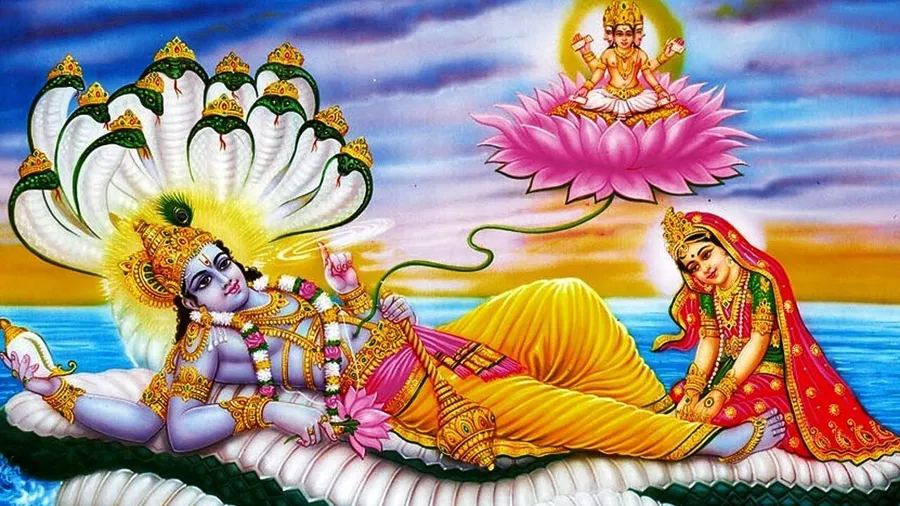Why Does Lakshmi Press Vishnu's Feet?
In pictures and statues of Hindu gods, we sometimes see Lakshmi, the goddess of good luck and money, gently touching Vishnu’s feet, the god who protects the world. This can make some people wonder – is Lakshmi somehow less important than Vishnu?
लक्ष्मीर्याः प्रसादाद्धि सर्वे लोकाः प्रतिष्ठिताः।।
By Lakshmi's grace (Prasaadaddhi), all the worlds (Sarve Lokaah) are established (Pratisthitaah).
लक्ष्मीर्मे श्रिया च मे धनानां मे अधिष्ठात्री।।
Lakshmi is my good fortune (Shreeyaa), she is also my wealth (Dhananaam), and she is the ruler (Adhishthaatri) of all these.
धनदा धान्यात्मिका च सर्वसौभाग्यदायिनी।।
She (Lakshmi) is the bestower of wealth, the essence of prosperity (Dhanhyaatmikaa), and the giver of all auspiciousness (Sarva Saubhagyadayini).
Lakshmi and Vishnu: A Divine Duality
श्रीविष्णुवल्लभा चैव कमला हृदयस्थिता।।
She (Lakshmi) is the beloved of Vishnu (Shri Vishnnuvallbha) and resides in his heart (Hridayasthita).
न लक्ष्म्या विना कृष्णोऽस्ति न च लक्ष्मीर्धनापतेः।।
There is no Krishna (Vishnu in his Krishna avatar) without Lakshmi, nor is there Lakshmi without the Lord of Wealth (Dhanapatheh - another name for Vishnu).
लक्ष्मीर्विष्णुरूपा न च विष्णुर्विना लक्ष्म्या।।
Lakshmi is the form of Vishnu, and Vishnu is not complete without Lakshmi.
Lakshmi, also revered as Shri, represents not just material wealth but also good luck, abundance, and spiritual well-being. Imagine her as the source of all good things that flow into the world. Vishnu, on the other hand, is the protector and preserver of the universe. He maintains cosmic order through his various avatars, ensuring balance and stability. Together, they represent a divine partnership – Lakshmi’s blessings flourish only within a stable and protected world, while Vishnu’s role is strengthened by Lakshmi’s presence.
The Power of Seva
पत्युः पदौ स्पृशन्त्याश्च पतिसेवा परायणे।
महतीं श्रियमेधेत सदा कल्याणकारिणी॥
A wife devoted to the service of her husband, who touches his feet, accumulates great merit and always brings auspiciousness.
योऽनुरक्तः पतिसुता पतिसेवा परायणा।
तस्याः पत्युः पदसेवायां स धर्मः परमं पदम्॥
A devoted wife, who finds her purpose in serving her husband, attains the highest virtue through the service of his feet.
नारीणां गुणवत्तां च पादसेवा न लघुता।
पतिसेवा धर्मेणैव वन्द्यते न हि कर्तृता॥
The virtue of women is not diminished by serving at the feet; serving one's husband is an act of righteousness and does not denote inferiority.
पादार्चनं न हीनेन न हीनः सेवकः कृतः।
यस्यां सेवा गुणायुक्ता सा कृता सविधेयता॥
Offering service to the feet does not make one inferior, nor is the servant diminished; when the service is full of virtues, it is considered a noble act.
The act of Lakshmi touching Vishnu’s feet doesn’t signify her being “lesser.” In Hinduism, Seva (service) is considered a sacred act, a way of expressing devotion and love. Think of it like helping someone you care about – it shows your deep respect and appreciation. By gently caring for Vishnu’s feet, Lakshmi demonstrates her support for his vital role in protecting the universe.
Lakshmi: The Supreme Shakti
श्रीविष्णुरूपा परा देवी लक्ष्मीः स्वयम्भुवा।।
Lakshmi, the supreme goddess (Paraa Devi), is herself the form (Rupaa) of Vishnu.
शक्तिः स्वरूपा परा ब्रह्मरूपा च जगन्मयी।।
Shakti is the supreme form of Brahman (ultimate reality) and the embodiment of the universe (Jaganmayi).
लक्ष्मीरूपा परा शक्तिः सर्वलोकैकमायिनी।।
The supreme Shakti manifests as Lakshmi, the illusionist (Maayini) who governs all worlds.
Going by the Shakta view, Shakti, is considered the source of all creation. Adishakti, the primal Shakti, is seen as the ultimate source of the universe, even giving rise to the tridev – Brahma, Vishnu, and Shiva.
Lakshmi is not merely a goddess of good fortune. She is a manifestation of Adishakti herself, embodying the boundless creative and sustaining energy that pervades the cosmos. Just as fire cannot exist without its heat, Vishnu’s power to preserve is incomplete without Lakshmi’s presence. By understanding Lakshmi as Adishakti, we dispel any misconception about her being “lesser” than Vishnu. She is not simply his consort; she is the very source of the power that allows him to fulfill his role.
Remember, Lakshmi’s gentle touch is not a sign of weakness, but a display of her immense power held within.
A Deeper Meaning
The act of touching feet holds layers of symbolism:
Respect and Reverence: In Indian culture, touching the feet of elders or revered figures is a traditional way to show respect and care. By doing this, Lakshmi acknowledges Vishnu’s position as the preserver god and the importance of his work.
Nurturing Action: Vishnu’s feet symbolize action and movement. By tending to them, Lakshmi ensures his energy is replenished, allowing him to continue his duties. It’s like giving someone a massage after a long day, so they can keep going strong.
Balance of Power: Just as a lotus flower (Lakshmi’s symbol) thrives only in clean water (symbolized by Vishnu), Lakshmi’s prosperity flourishes alongside Vishnu’s stability. This act reinforces the concept of their interdependence and shared power.
Circulation of Energy: In Ayurveda, the ancient Indian system of medicine, the feet are considered important energy centers. By massaging them, Lakshmi facilitates the flow of vital energy (Prana) within Vishnu, ensuring his well-being and potency.
Vishnu's Reverence for Lakshmi
The idea that Vishnu holds a higher position is dispelled by his own actions. He often consults Lakshmi before undertaking important tasks, seeking her wisdom and acknowledging her role in decision-making. Additionally, Lakshmi is revered as Vishnu’s Shakti, his divine feminine energy. Just like fire and its heat cannot exist separately, Vishnu’s power to manifest is incomplete without Lakshmi’s presence.
Let’s explore some stories from Hindu scriptures that showcase Vishnu’s respect for Lakshmi:
The Samudra Manthan: In this epic tale, when the devas and asuras churn the cosmic ocean to obtain the elixir of immortality, Lakshmi emerges as a magnificent goddess. Vishnu, recognizing her as a sign of auspiciousness and prosperity, welcomes her as his consort, signifying the importance of her presence in his endeavors.
The Vamana Avatar: In this avatar, Vishnu takes the form of a dwarf to reclaim the three worlds from King Mahabali. However, before approaching the king, Vishnu seeks Lakshmi’s counsel and blessings, highlighting her wisdom and importance in ensuring the success of his mission.
Oneness of Duality
Ultimately, Lakshmi and Vishnu represent two aspects of the same divine principle. They are not separate entities but complimentary forces, like the sun and its radiance. Vishnu embodies stability and sustenance, while Lakshmi embodies prosperity and fortune. Together, they represent the harmonious balance necessary for the universe to flourish.
Beyond Misconceptions
The act of Lakshmi touching Vishnu’s feet transcends a physical gesture. It signifies deep respect for his role, the importance of service within a relationship, and the interconnectedness of their divine energies. By understanding this symbolism, we move beyond simplistic interpretations and appreciate the profound message of their divine union. Their story reminds us of the importance of respect, love, and teamwork in creating a happy and prosperous world.










108 Names of Maa Durga